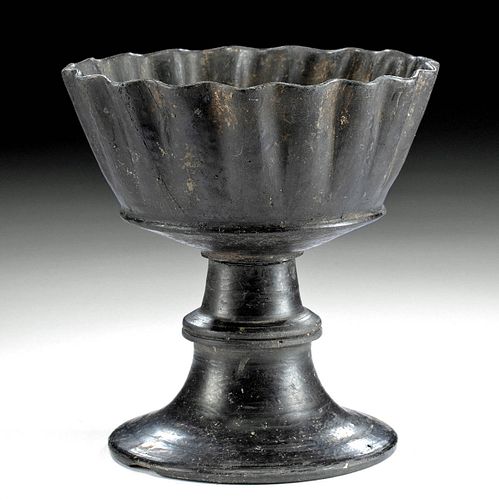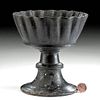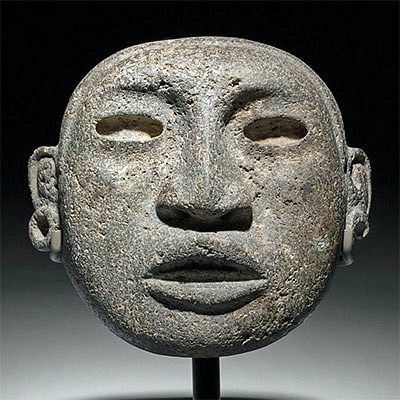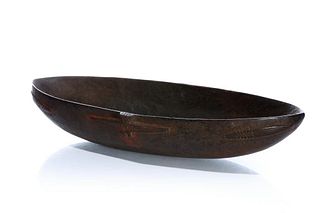Rare Etruscan Bucchero Ware Fluted Chalice
Lot 45
About Seller
Artemis Fine Arts
686 S Taylor Ave, Ste 106
Louisville, CO 80027
United States
Selling antiquities, ancient and ethnographic art online since 1993, Artemis Gallery specializes in Classical Antiquities (Egyptian, Greek, Roman, Near Eastern), Asian, Pre-Columbian, African / Tribal / Oceanographic art. Our extensive inventory includes pottery, stone, metal, wood, glass and textil...Read more
Categories
Estimate:
$4,000 - $6,000
Absentee vs Live bid
Two ways to bid:
- Leave a max absentee bid and the platform will bid on your behalf up to your maximum bid during the live auction.
- Bid live during the auction and your bids will be submitted real-time to the auctioneer.
Bid Increments
| Price | Bid Increment |
|---|---|
| $0 | $25 |
| $300 | $50 |
| $1,000 | $100 |
| $2,000 | $250 |
| $5,000 | $500 |
| $10,000 | $1,000 |
| $20,000 | $2,500 |
| $50,000 | $5,000 |
| $100,000 | $10,000 |
| $200,000 | $20,000 |
About Auction
By Artemis Fine Arts
Mar 24, 2022
Set Reminder
2022-03-24 10:00:00
2022-03-24 10:00:00
America/New_York
Bidsquare
Bidsquare : Exceptional Antiquities Ethnographic Fine Art
https://www.bidsquare.com/auctions/artemis-gallery/exceptional-antiquities-ethnographic-fine-art-9057
Museum-worthy examples of classical antiquities (Egyptian, Greek, Roman, Near Eastern), Viking, Far East / Asian, Pre-Columbian, African / Tribal, Oceanic, Native American, Spanish Colonial, Fossils, Ancient Jewelry, Fine / Visual Arts, so much more! Artemis Fine Arts info@artemisgallery.com
Museum-worthy examples of classical antiquities (Egyptian, Greek, Roman, Near Eastern), Viking, Far East / Asian, Pre-Columbian, African / Tribal, Oceanic, Native American, Spanish Colonial, Fossils, Ancient Jewelry, Fine / Visual Arts, so much more! Artemis Fine Arts info@artemisgallery.com
- Lot Description
Northern Italy, Etruscan, likely Vulci, ca. 6th century BCE. A stunning fluted chalice of a remarkably unique form, masterfully hand-built from pottery boasting a lustrous black surface - a distinguished characteristic of ancient bucchero ware! Sitting upon a tiered, pedestal foot, the unique vessel presents a conical leg and a rounded bottom that leads to a carinated edge, flared, fluted walls, and a broad, wavy rim. A projecting double band further adorns the leg, perhaps serving to enhance one's grip of the vessel. Size: 5.6" Diameter x 5.8" H (14.2 cm x 14.7 cm)
Etruscan bucchero ware, produced between the 7th and 5th centuries BCE in central Italy, is characterized by its smooth clay and dark grey or black shiny, polished surface. This effect was achieved through the unique "reduction" method in which it was fired. After the unfired ware was placed in the kiln and the fire was started, the vent holes would be closed in order to limit the supply of oxygen and allow the oxygen-starved flames in the smoke-filled atmosphere to draw oxygen molecules from the iron oxide of the pottery, thus changing naturally red clay to black. The lustrous finish was then attained via diligent burnishing and sometimes through the application of a thin layer of slip. Objects in this style have been found in tombs around modern Tuscany and northern Lazio, and as exported wares as far afield as North Africa and Spain.
This type of chalice seems to have been inspired by Assyrian chalices imported from the Near East a century earlier. This chalice almost certainly came from a funerary context, placed in an opulent Etruscan tomb as an offering. However, it was probably placed there because similar - or maybe even the same - vessels were used in life by the people of Etruria; items placed in the tomb were meant to be a link between the world of the living and the dead, and to help furnish a symbolic domestic space for the deceased. Therefore, it seems likely that chalices like this one were also used in everyday life for drinking wine or other beverages.
Cf. British Museum, 1814,0704.465, J. Paul Getty Museum, 83.AE.403, Harvard Art Museum, 2004.208, and Metropolitan Museum of Art, 96.9.78.
A slightly taller example
Provenance: private San Francisco, California, USA collection, acquired 1970s to 2000s
All items legal to buy/sell under U.S. Statute covering cultural patrimony Code 2600, CHAPTER 14, and are guaranteed to be as described or your money back.
A Certificate of Authenticity will accompany all winning bids.
PLEASE NOTE: Due to recent increases of shipments being seized by Australian & German customs (even for items with pre-UNESCO provenance), we will no longer ship most antiquities and ancient Chinese art to Australia & Germany. For categories of items that are acceptable to ship to Australia or Germany, please contact us directly or work with your local customs brokerage firm.
Display stands not described as included/custom in the item description are for photography purposes only and will not be included with the item upon shipping.
#170528Repaired from several pieces with restoration and repainting over break lines. Restoration and repainting to rim. Chips with minor loss to foot, interior of leg, and rim. Nicks, scratches, and abrasions in some areas, commensurate with age. Otherwise, excellent with beautiful pigment.Condition
- Shipping Info
-
All shipping is handled in-house for your convenience. Your invoice from Artemis Gallery will include shipping calculation instructions. If in doubt, please inquire BEFORE bidding for estimated shipping costs for individual items.
-
- Buyer's Premium



 EUR
EUR CAD
CAD AUD
AUD GBP
GBP MXN
MXN HKD
HKD CNY
CNY MYR
MYR SEK
SEK SGD
SGD CHF
CHF THB
THB














